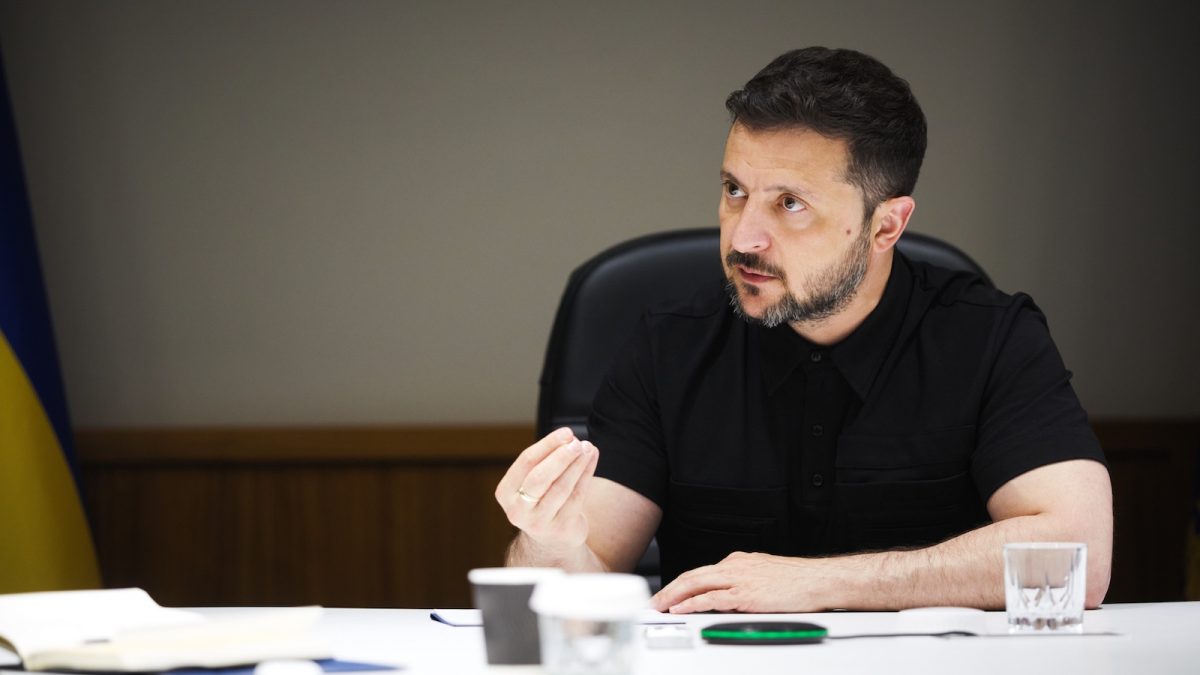„Viktor is making a historic mistake.” An exclusive interview with President Zelenskyy
„His policy is, unfortunately, anti-Ukrainian. And anti-European. He is using this in his domestic policy: he wants to turn the war in Ukraine to his own advantage in the elections. That is dishonest”, Volodymyr Zelenskyy tells Válasz Online about Viktor Orbán. The President of Ukraine, who, after 1,200 days of full-scale war, gave his first interview to us among all Hungarian media outlets, also talked about why was it a serious mistake for the Hungarian Prime Minister to bet on good relations with Vladimir Putin. We also asked him about our bilateral spy scandal that broke out in early May – “we do have everything in our possession” –, about the Hungarian government’s posters depicting him, the end of the war, the peace talks in Istanbul and possible territorial concessions as well as the difficulties of mobilization. An exclusive interview from the Office of the President of Ukraine in Kyiv.
We meet shortly after Russia launched one of its largest drone and missile attacks against Kyiv and Kharkiv since February 2022. What do these actions suggest to you?
Unfortunately, the Ukrainian people, who are fighting for survival, experience this almost every day. There is nothing new about the weekend attacks. I know there is a narrative that they should be seen as a response to Operation Spider Web, but this is not the case. The people who say this do not understand that this is not the first month of the war. Russia has been doing this for years. To give just one example, on the day before Operation Spider Web, we were attacked with 480 drones and missiles. We understand what Russia is like, so it is quite clear to me what such actions mean: that Putin does not want to end the war, but is looking for various excuses to attack us. They are firing missiles at civilian targets after we attacked their military assets successfully. He can say, „I am the hero of my nation, so a response to Ukraine’s actions is necessary.” But the reason why they are attacking us is in Putin’s mind.
In Putin’s mind?
He wants to occupy Ukraine and eliminate our independence. It’s not about our buildings, it’s about the pain this causes the Ukrainian people. He doesn’t want to destroy our cities, he wants to destroy the Ukrainian nation and statehood.
Many people still don’t believe it and don’t understand that Putin is seeking to completely subjugate Ukraine. His goal is to wipe us off the map.
Sustainable peace will only be possible if the states that are capable of exerting real pressure understand Putin’s true goals. A ceasefire is certainly possible sooner – and it is important that it happens – but peace will only come when the world understands what the Russian president wants.
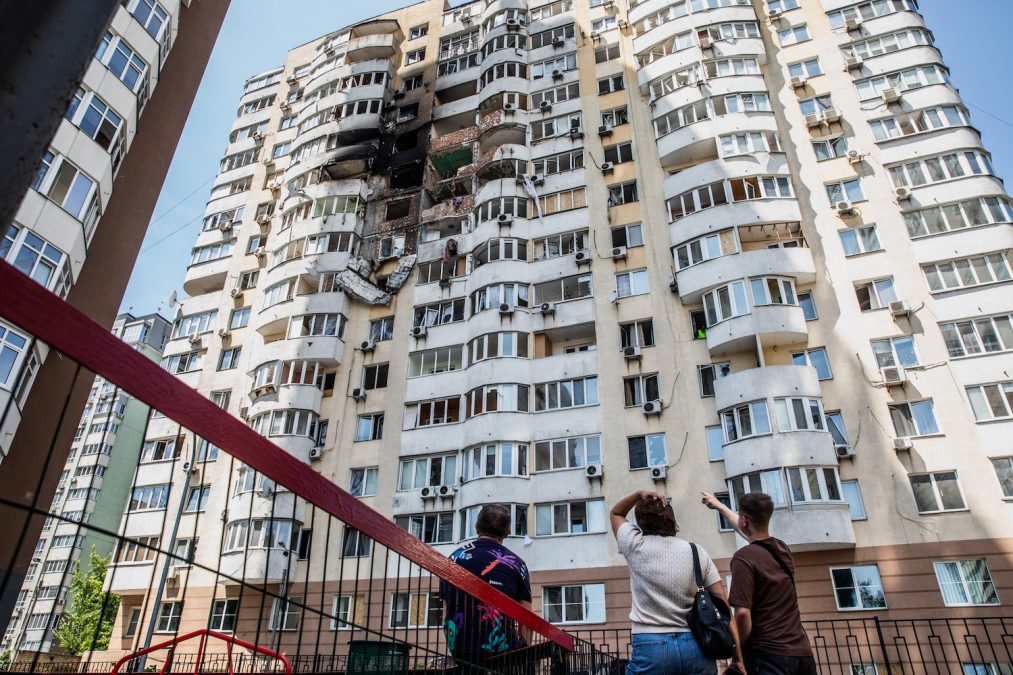
Contrary to all predictions, Ukraine and the Ukrainian people have been resisting Russia in a large-scale war for 1,200 days. With such intensity, how long can they keep it up?
That is a very difficult question. No one has yet tried to measure how much the Ukrainian people can endure. We would have ended this whole thing yesterday. So every day is very difficult. It has been difficult for a year now because of the losses. World leaders can, of course, speculate on how much longer Ukraine can hold out, but we expect the world to stop Putin. The US could impose sanctions, and together with Europe, it could figure out how to influence China. There is no point in waiting to see how long the Ukrainians can resist. No one should sit and wait, because we are struggling with a situation that very much looks like a transition to World War III. We must work every day to communicate with each other. With powerful countries that could restrain the Russian economy through sanctions and the severing of economic ties.
That would hurt many.
It may hurt, but if they don’t think about ending their dependence on Russia now, it will hurt even more later. Ukraine was also dependent on Russia: the Russian fleet was stationed in Crimea, and we used to get gas and oil from them. And what was the outcome? When Ukraine began to consider its independence and sovereignty, Russia responded rapidly. Even in the years before the occupation, they were preparing society for war. With small things. In eastern Ukraine, but especially in Crimea, they were issuing Russian passports illegally, called passportization, and spreading their own narrative on television, radio, and in newspapers. So in Ukraine, someone else was pointing out who was good and who was bad. It is the responsibility of both Russians and Ukrainians that they allowed this to happen. Meanwhile, Russian society was also radicalized to support the war with a blind eye. They claim that we are threatening their independence. Everything was turned upside down. But there are always precedents for such things. The West is also portrayed as their enemy, so it is pointless for some European leaders to think that if they maintain relations with Putin, war and hatred will leave their countries untouched.
We will talk about them later, but when you mention the pressure that powerful countries are hoped to exert, I recall an interview you gave to the American magazine The Atlantic in April 2022: “When certain leaders ask me what weapons I need, I have to take a moment to calm down, because I already told them a week ago. It’s like the movie Groundhog Day. I feel like Bill Murray.” Do you still feel that way?
During an interview, when I was asked repeatedly what weapons we needed and what sanctions should be imposed, I realized that in order to open people’s eyes and prevent those who are tired of war from scrolling past news about Ukraine on Instagram – because they want something more entertaining or it’s the weekend – we cannot take a break. And to get the message across to leaders, I have to repeat the same sentences over and over again to journalists. It’s part of my job. It’s what I have to do, every day.
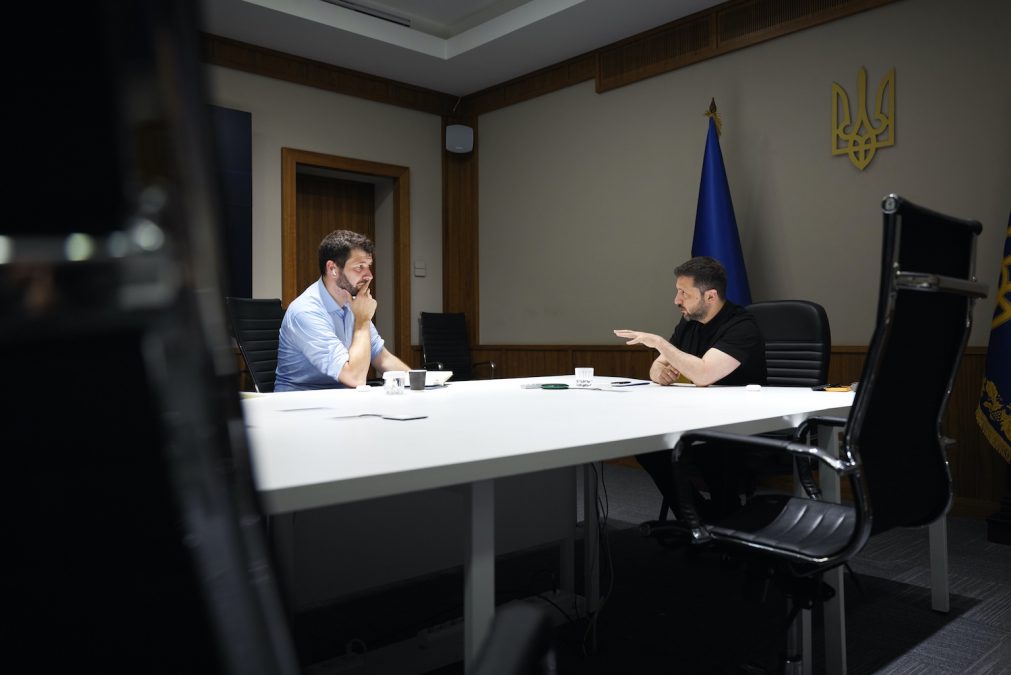
The latest round of peace talks in Istanbul on June 2, ended after an hour, once the parties presented their own memoranda; for the time being, progress has only been made on the exchange of prisoners of war. Do you still have confidence in the talks?
I believe that, for the time being, they are proceeding as the Russians are trying to frame them. They are trying to weaken the positions of Western partners with regard to Russia. After all, it is easier that way. They are professionals at this: they are absolute world champions in lying. In diplomatic terms, they are manipulators. Those with whom our delegation is negotiating are also like this. It would therefore be good if the mediating countries did not focus on what they could lose from sanctions – what economic disadvantages they would face, or what would happen to space cooperation and satellite communications – but concentrated on what the negotiations are about: the war. On the fact that people are dying. The rest can be discussed in bilateral talks. If the war remains just one piece of a larger puzzle, your position will be weakened. As long as this is the case, the Russians will not change their agenda or their lies. Look at what happened to the prisoner exchange that was planned for the day of our conversation!
Ideally, an agreement is reached with both sides willing to compromise on their terms. What would you be willing to compromise on? Your terms of 2 June no longer mention Ukraine’s 1991 borders.
Our memorandum is the basis for negotiations. Based on this, our delegation has a mandate to discuss humanitarian issues—the issue of prisoners of war and abducted children—or a ceasefire. However, they do not have a mandate to discuss Ukraine’s sovereignty and territorial integrity. This is our own constitutional matter.
It is my job to hold talks on territories – and Putin’s, who seized them. I will not discuss my position on this with anyone else.
But we have already said that we will not recognize the currently occupied territories as de jure Russian. These are not even the same: there was no war in Crimea, but eastern Ukraine is a dead zone with destroyed villages and towns. We have also said repeatedly that if we receive adequate security guarantees preventing Putin from continuing the war, then we will have time to decide on territorial issues. By diplomatic means, not with weapons. And this is already a major compromise, because we have a long road ahead of us. We want to end the war, but this requires the will of both parties. If the other party is not ready for this, it will always come up with something. They even told our delegation: we know that our memorandum is an ultimatum, and you will not accept it. Thus, the question is not the quality of the Istanbul format, but what to do about the Russians’ lies. That is why we need strong mediators: so that Russians cannot back out of the agreements reached in the negotiations. The United States does not appear to be a strong mediator at the moment: the Russians told them not to be at the table, and they simply walked away. Why? Because of their soft policy towards Russia.
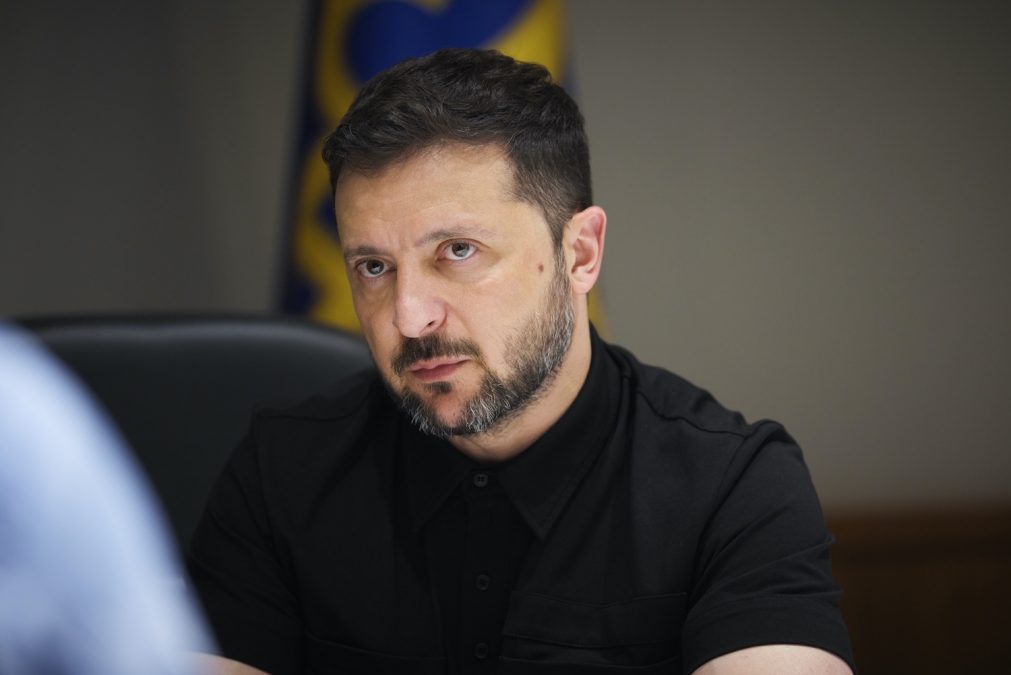
Don’t you think Russia is stalling because of the confidence it has gained from its territorial gains on the battlefield? They recently advanced in the Sumy region but are also slowly moving forward in the east. Meanwhile, your elite units are forced to operate a separate Spanish-language recruitment platform, presumably targeting Latin American mercenaries rather than Spanish citizens.
You’re painting a generalized picture. It might seem like the end of the world is approaching from here, 10,000 kilometers away…
… Russia is not gaining territory on the battlefield?
If Ukraine stops resisting, that 10,000 kilometers could shrink considerably, and we would face much greater challenges. As for Western soldiers, the Ukrainian army operates on a contractual basis, supplemented by mobilization and the joining of volunteers. At the beginning of the war, soldiers arrived from several countries to fight for Ukraine, but their numbers are incomparable to the 12,000 North Koreans recruited by Russia, for example. In our country, including Russians and Belarusians fighting for the freedom of their own homeland, we are not talking about thousands.
Meanwhile, Ukraine is struggling with mobilization, and the recruitment of people aged 18–24, which began in February, is not progressing as hoped.
Mobilization is a problem in every war. Ukraine is no exception, as we want the war to end. People are getting tired. We can mobilize 27,000 people a month, while the Russians can mobilize 40,000 to 50,000 because their losses are greater. Mobilization is possible in our country because of the state of war. No one else has any experience in how to stop Putin. We were the ones who stopped him. You are right in that this is a difficult period. We did not mobilize 18- to 24-year-olds, but offered them one-year contracts. I have never spoken about this before, but since you asked, I will tell you what I think, because it is a sensitive issue: I do not believe that we should mobilize people from the age of 18, as the leaders of other countries have thought. Operation Spider Web has shown that it is not the number of people that matters, but weapons and technology. And money and exerting pressure. The sanctions would target the money that the Russians are using to finance the war. However, when it comes to sanctions, as Western partners list the reasons why they did not decide to impose them, they include that Ukraine did not mobilize people aged 18 and above.
To be honest, we gave 18- to 24-year-olds the opportunity to show that they can serve if our partners want them to. We have now given them that opportunity, in accordance with our legislation. But in the meantime, thousands are fighting on the front lines without adequate weapons.
How do you explain this to the partners?
In February, I told President Trump how he could influence Putin: „Here is the package of weapons and missiles. We have the launch codes. Agree to a ceasefire, or we’ll give the keys to the Ukrainians. President Putin may not like it, but there can be no negotiations over territory until there is a ceasefire.” Is that so complicated? Where are these words being said by the US or China? Not only the US, but all other countries should say: stop the fighting, or we will give the weapons to Ukraine. The Russian people may not dare to speak out against the war, but they would certainly be frightened if missiles could be aimed at them. Then Putin would have to deal with his own people. That would be „peace through strength.” It’s not a very complicated way to end the war—it’s just hard to find the will to do it. We hope that the powerful countries will gradually open their eyes and that their societies will push them to make tough decisions. Meanwhile, the Russian president says that we need to talk about the root causes of the war. Who cares about the root causes? People are dying. That’s why it’s not fair to ask questions like the one you asked earlier: how long Ukraine can hold out. That depends on other countries too. Including Hungary.
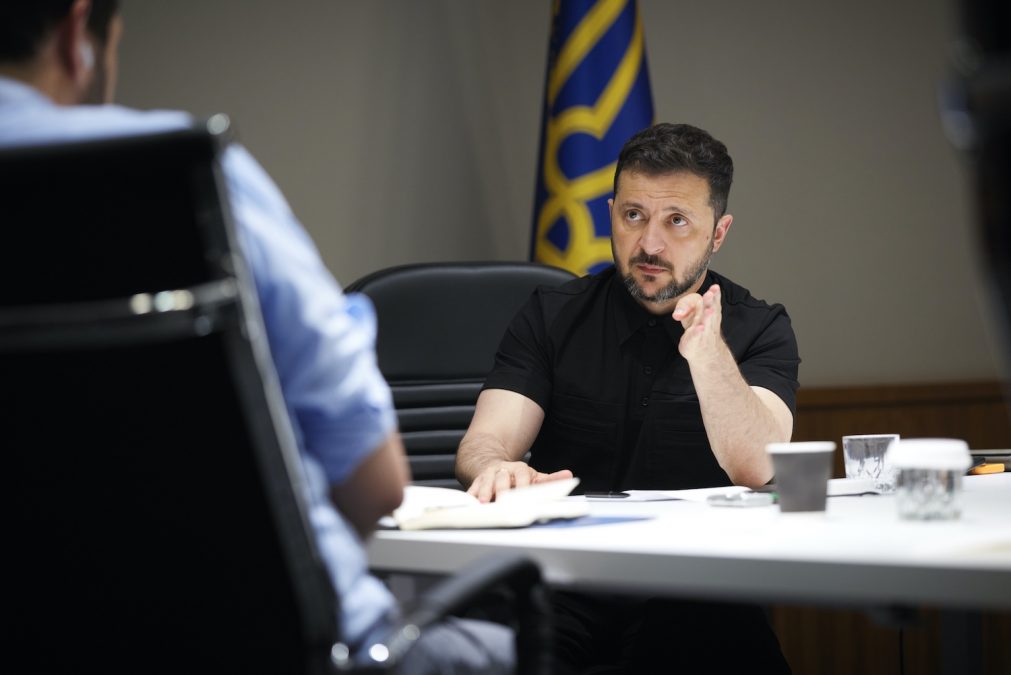
Let us talk about Hungary then. The Kyiv-based Rating Group research institute found in February that Viktor Orbán is the least popular politician among Ukrainians after Russian President Vladimir Putin and Belarusian leader Aliaksandr Lukashenka: only 11 percent of respondents had a positive opinion of him.
The Hungarian prime minister?
Yes. Does he deserve this?
Viktor Orbán’s position does not reflect the position of the whole of Hungary. This is the difference between Hungary and Russia: in Russia, Putin’s position is the same as the one held by his society. Viktor’s policy is, unfortunately, anti-Ukrainian. And anti-European. He is using this in his domestic policy: he wants to turn the war in Ukraine to his own advantage in the elections. That is dishonest. Do you think I am happy that Viktor is in the same company as Putin and Lukashenko in this survey? No, I’m not happy about it. He is flooding society with false information, which is radicalizing people. It’s damaging our bilateral relations. I’ve already mentioned passportization. Well, this was followed by giant billboards with pictures of our leaders on the Russian side. Isn’t something similar happening in Hungary? Hungary is a member of the EU and NATO. It cannot behave as if it hates both. I understand that there is EU bureaucracy and there are domestic issues. I don’t even want to talk about Hungarian domestic issues. But there is a reason why he ended up at the bottom of the list. I wish Viktor was at the top. After all, we are neighbors.
Why is he behaving like this?
Perhaps he thinks he can get what he wants through oil and gas, and that is why he is betting on maintaining good relations with Putin and bad relations with Ukraine. He thinks he has made the right choice, but I am convinced that he will lose.
And I say this from a historical perspective, not because of the elections. I don’t want to interfere in those. I have always sought productive dialogue with him, but his actions and operations are crossing the boundaries of Ukraine’s sovereignty. And he has no right to cross that line. Viktor always said to me: „Ceasefire, ceasefire, ceasefire. The new US president will come, and he will tell Putin.” I replied: „Believe me, Ukraine wants that too, but there are conditions.”
When he visited Kyiv last July, were you aware that he would be in Moscow a few days later?
I didn’t know about it. It was his decision. But he could have told me. He comes to visit, talks about bringing the war to an end – and then he goes to Russia. Did the Russians know about this? Probably yes. It couldn’t have been that he suddenly decided to go to Russia after his meeting here. He knew in advance, he knew what he was doing. Is that an honest relationship? No, it isn’t. He’s going somewhere else to discuss us. Of course, he can go anywhere he wants, he’s the leader of a sovereign country, but he went to talk about war – a war that affects us, the Ukrainian people. He really could have said something.
The latest stage in the deterioration of bilateral relations is the so-called spy scandal. The Ukrainian Security Service, the SBU, made an unusual public announcement about the arrest of alleged Hungarian spies, to which Hungary responded with a similar move in downtown Budapest, and the detention of another suspect was extended shortly before our conversation. Are you not concerned that there is no way out of this escalation?
There is no problem if we respect each other. That is how problems can be solved. Let’s put it this way: Budapest has tried to interfere in Ukrainian internal affairs in dozens of different ways. You could not have heard about these. We stopped the illegal distribution of passports in Transcarpathia before the war. Most of the cases were dealt with quietly, among ourselves. Why did we make the current case public? We have additional photos and videos of various meetings organized by the Hungarian Military National Security Service (KNBSZ) on Hungarian territory, which we will also publish if necessary. I don’t want to threaten anyone, but
we do have everything in our possession. This includes how KNBSZ paid its intelligence asset. We have documented everything. The Hungarian network has been developed since 2021, and military-related questions were raised in 2024-25. The most recent information transfer took place on 25 March this year.
Why was it necessary to look for our vulnerabilities in the Ukrainian-Hungarian border region? Why did the Hungarians want information about where we had deployed the S-300 air defense missile system there? That’s what they were interested in. They even had a list of questions on their phones – we have them too – with eleven questions, including what the people of Transcarpathia would say about the presence of Hungarian peacekeepers. And where our various military units are stationed. How should we respond to this in times of war? I am not saying that Budapest wants something, but if it does not, then to whom is it gathering information? I asked NATO officials whether they had asked the Hungarians to collect data on such matters. They replied that they had not. I am the president of a country at war – how would you have reacted if you were in my place? I don’t blame Viktor, I blame the KNBSZ.
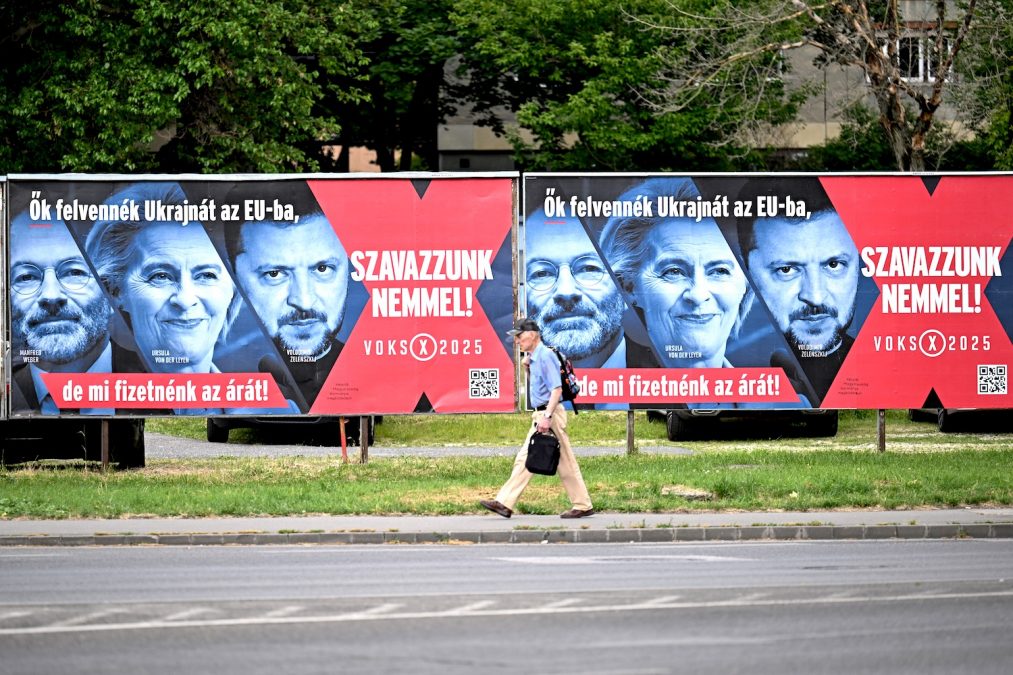
You may not blame “Viktor,” but in the meantime, he is asking the Hungarian people to vote on Ukraine’s EU membership, and the country is being plastered with a second series of posters – it’s good that I’ll finally get to meet the person whose portrait I see from my balcony every day! What was your reaction to this campaign?
He is using Ukraine for his own electoral purposes. He does not understand that this will have much more serious and dangerous consequences: the radicalization of Hungarian society and its anti-Ukrainian sentiment. By not helping us, he is doing Putin a favor. That is why I said that Viktor is making a serious, historic mistake. That is my personal opinion. I cannot smile and give hugs when I see what is really going on. Because reality does not have to be different from politics. If he is ready for a proper relationship, we will find a framework for it. But how can he use my face for his own election? I did not give him permission to do that! I am the president of another country. It is wrong for him to use me for his domestic politics. There are no Orbán billboards in other countries. Because it would not be ethical.
Where do you see yourself and Ukraine in five years?
My greatest dream is a country living in peace. I have no other dream, no other plan. That is what I really want. Peace. I am convinced that Ukraine, with the help of the world, will be rebuilt. Nothing is more important than that.
Cover picture by the Office of the President of Ukraine
We thank Krisztián Jójárt and András Rácz their assistance in preparing this article!

